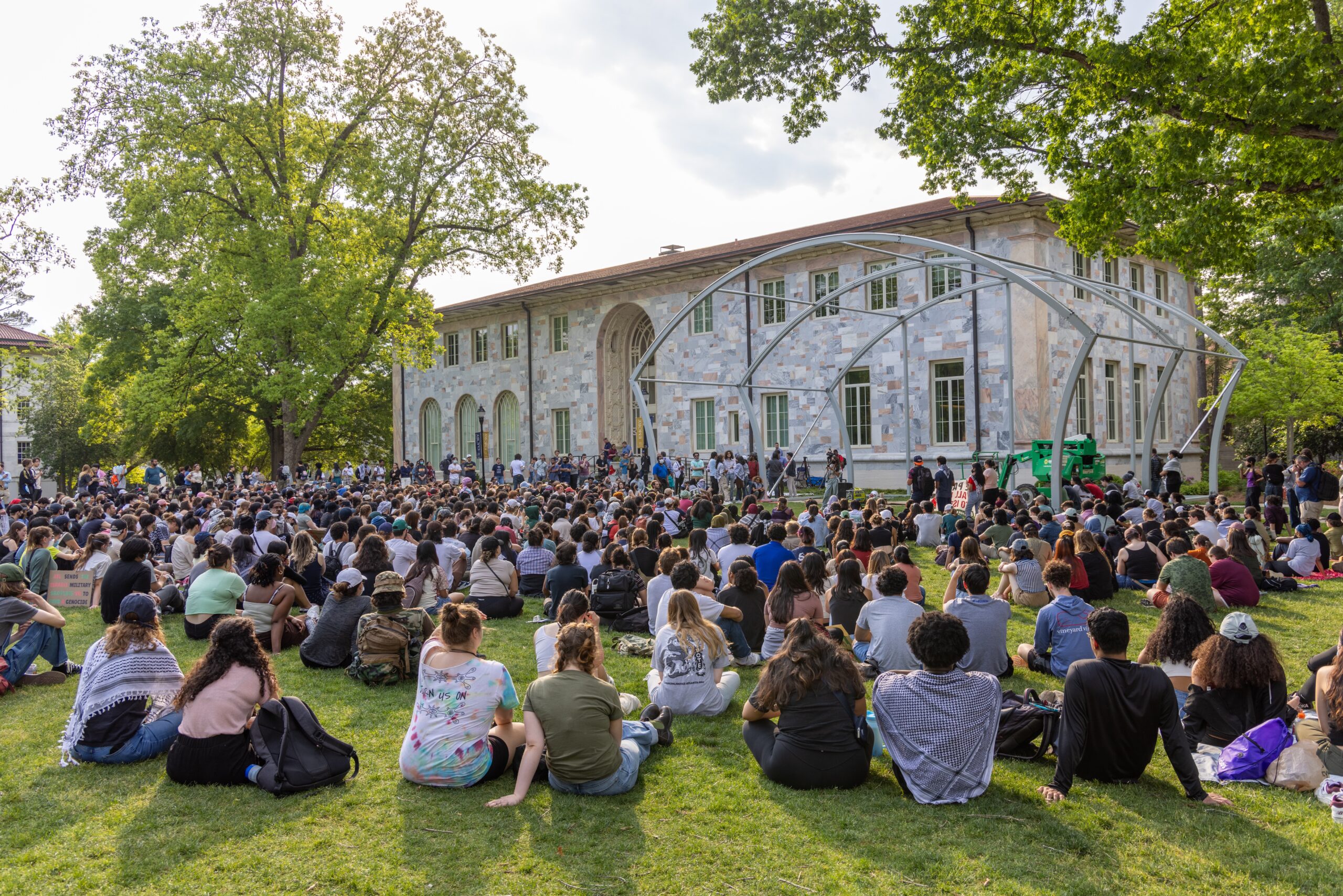
Community members participating in protest gather peacefully on the Emory Quadrangle (Jack Rutherford/News Editor).
One year ago, the Emory University Police Department (EPD) and Atlanta Police Department (APD) removed peaceful student protestors from the Quadrangle. On Thursday morning, the same law enforcement organizations forcibly removed Emory students and community members from that same Quad. While deplorable, this scene is eerily familiar, speaking to a long legacy of student suppression and state violence on Emory’s campus.
Despite the administration’s consistent stifling of student protests, students continue to return to our Quad time and time again. Gathering there, in the center of campus, is a symbol of unity and strength against the Emory administration, the Board of Trustees, politicians and corporations who may wish to stop these protests and others like them in the future.
On the morning of April 25, Emory Stop Cop City joined a fresh wave of rallies on university campuses across the country in opposition to Israel’s ongoing occupation of Palestine by staging an encampment on the Quad. The encampment stood for only a matter of hours before EPD, APD and Georgia State Patrol officers closed in on the protestors, tackled individuals, sprayed irritant gas and used zip ties for arrests. This violence only began when Emory permitted EPD and outside law enforcement onto the Quad to disrupt the previously peaceful scene.
The actions taken by Emory’s administration yesterday were disgusting and eerily echo the administrative repression on campus during the 1969 Civil Rights Movement protests and the Vietnam War. This pattern is abhorrent and illustrates exactly why students must show up for Palestine, for Atlanta and against the Atlanta Public Safety Training Center, colloquially known as Cop City.
Words are our greatest weapons. It is essential to claim back the narrative of these protests from the administration and the police. When we speak to student protestors, all with their own stories to contribute, we hope to parse together the community strength present at Emory in the face of a collective struggle. Instead of a vicious cycle of oppression, we urge you to see Emory’s social justice legacy as a virtuous one: a cycle of students rising up against oppressors. When they are brutalized and shut down, this community keeps coming back to the Quad.
To quote the protestors on the Quad this week, Emory is “our campus.” On “our Quad,” law enforcement forcibly removed and arrested Emory community members. Gathering at the heart of campus is a repeated symbol of students’ right to exist and assemble together, regardless of identity, background and, sometimes, even opinion.
“The point is that we are open to everyone. I’ve seen people who don’t support our cause show up at our events, and that’s fine because they feel safe to be there with us,” student organizer Ibrahim (25B), who declined to provide his last name due to safety concerns, said.
Ibrahim, along with his fellow organizers, did not seem to perpetuate division at these protests. By collaborating with external organizations like Stop Cop City and the Atlanta Party for Socialism and Liberalism and by keeping their movement open to all, these students have continually engaged with the Atlanta community, recognizing an intertwined future between our school and our city. Instead of allowing University President Gregory Fenves to fortify the Emory bubble, students and community members have continually come together to transcend it. Above all, the students and community members we spoke with on Friday were focused on togetherness, in the face of and despite the institutions that oppose them.
“The Quad is a place where revolutionary education can happen,” student participant Bella (24B), who declined to provide her last name due to safety concerns, said. Universities are responsible for crucial discourse, but Emory has failed. Now, students must, and have, taken the matter into their own hands.
In response to valid student demands of divestment from Israel and Cop City, Fenves, along with his Board of Trustees, has enabled the brutal militarization of higher education.
In his Thursday email, Fenves shared misleading information surrounding these events, claiming that the protestors were “largely not affiliated with Emory.” This claim is reductive given that, although there were representatives from multiple off-campus organizing groups, the majority of the protestors on the Quad were, in fact, members of the Emory community; out of the 28 people arrested, 20 were Emory-affiliated. Fenves’ repeated use of inflammatory rhetoric marginalizes students and stokes the flames of division, creating the false idea that individuals present at Thursday’s protest are somehow inherently less a part of the greater Emory community. The administration has proven that their campaign, “One Emory,” starts and ends with Emory’s marketing materials.
Fenves also referred to the protest’s setting as “our Atlanta campus.” Emory does not belong to the administration and Emory does not belong to the puppeteering Board of Trustees. Currently, Emory College of Arts and Sciences faculty are discussing the possibility of endorsing Fenves’ removal. Emory is defined by the people who comprise it — not the actions or emails of a singular individual. Projecting our grievances on Fenves alone does not eliminate the institutional issue: Along with Fenves, the Board of Trustees polices student voices and enables police brutality, continuing to suppress free speech.
From the South River Forest to Gaza, oppressed structures are indeed interconnected — but so are we. There is solidarity in sharing music, food and knowledge. In moments like the hours just before sunset on Thursday, when officers had temporarily receded and the Quad was filled with peaceful protestors resting on the grass, collective joy became a means of resistance.
In the coming days, this week’s events will likely be minimized, misconstrued and misinterpreted. Remember this: Protestors have occupied many spaces, including the Quad, Cox Hall and the Candler School of Theology. Not only do these actions symbolize the global struggle of occupation, but they also demonstrate how the Emory community is occupying its own narrative. We, as opinion journalists and students, invite you — no matter who you are or what you believe — to share your narrative. Occupy this campus and share in its community, and do not allow anyone, including administration, to take your voice away.
The Opinion Editorial Team is composed of Managing Editor Ellie Fivas (24Ox) and Opinion Editors Lola McGuire (26C) and Safa Wahidi (23Ox, 26C).
Find the submission box for op-eds, letters to the editor and open letters at https://emorywheel.com/op-ed-submissions/.





